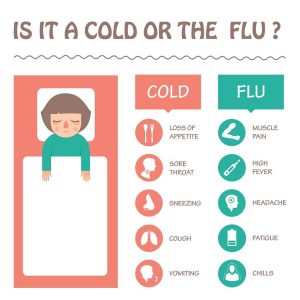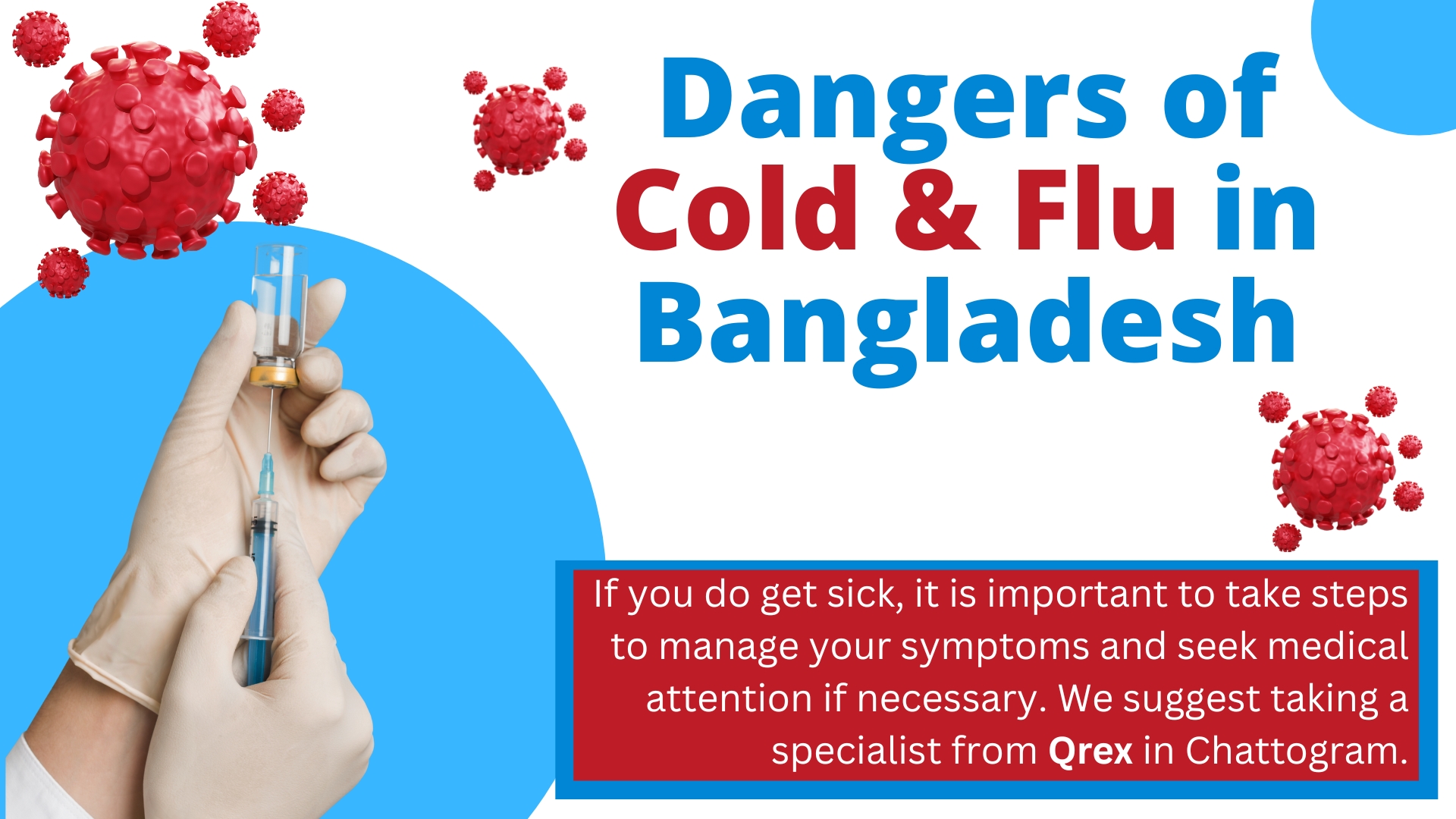Dangers of Cold and Flu in Bangladesh: How to Protect Yourself and Family
Winter season has appeared in Bangladesh. Also, increase the number of cold and flu patients in the whole country. Cold and flu season is a time of year when the incidence of colds and flu tends to increase. These respiratory illnesses are caused by viruses and are transmitted through the air when an infected person coughs or sneezes, or through close contact with contaminated surfaces or objects. While colds and flu can affect anyone, certain individuals are more vulnerable to developing complications, such as young children, elderly individuals, and those with compromised immune systems.
Colds and flu can cause a range of symptoms, including fever, cough, sore throat, body aches, and fatigue. While colds are generally less severe and shorter in duration than flu, both can lead to serious complications if left untreated, such as pneumonia, bronchitis, and sinus infections. In extreme cases, colds and flu can even lead to hospitalization or death, particularly in vulnerable populations.
It is important to take preventive measures to avoid getting sick during cold and flu season. This includes washing your hands frequently, covering your mouth and nose when you sneeze or cough, avoiding close contact with sick individuals, and getting vaccinated against the flu. In addition, diagnostic tests can help to identify the presence of a cold or flu and prevent the spread of illness by allowing for early treatment. By following these preventive measures, you can protect yourself and your family from the dangers of cold and flu season.
Differences between Colds and Flu
Colds and flu are respiratory illnesses that are caused by different types of viruses. While they have some similarities, they also have some key differences in terms of their symptoms, duration, and severity.
Symptoms:
Colds: Symptoms of a cold may include a runny or stuffy nose, cough, sore throat, headache, and fatigue. Colds are generally less severe than flu and may also cause a fever, although it is usually low-grade.
Flu: Flu symptoms are often more severe than those of a cold and can include fever, cough, sore throat, body aches, fatigue, and sometimes vomiting and diarrhoea. Flu symptoms can come on suddenly and may be accompanied by a high fever and severe muscle aches.
Duration:
Colds: Colds typically last for a few days to a week. Symptoms may be mild at first but may gradually become more severe as the illness progresses.
Flu: Flu symptoms tend to come on suddenly and may last for several days to a week or more. Symptoms may be severe at the start of the illness and may gradually improve as the person recovers.

Severity:
Colds: Colds are generally less severe than flu and do not typically lead to serious complications. However, they can cause discomfort and may make it difficult to carry out daily activities.
Flu: Flu can be more severe and can lead to serious complications, such as pneumonia, bronchitis, and sinus infections. Flu can also be life-threatening, particularly for vulnerable populations, such as young children, elderly individuals, and those with compromised immune systems.
How Cold and Flu are Transmitted
Both colds and flu are caused by viruses and are transmitted through the air when an infected person coughs or sneezes, or through close contact with contaminated surfaces or objects. It is important to practice good hygiene, such as washing your hands frequently and covering your mouth and nose when you sneeze or cough, to reduce the risk of getting sick. In addition, getting vaccinated against the flu can help to protect against this potentially serious illness.
What Preventive Measures Should Take to Avoid Cold and Flu?
Preventive measures are important for avoiding illness and protecting oneself and others from the spread of disease. This is particularly true during cold and flu season when the incidence of these respiratory illnesses tends to increase.
Practice Good Hygiene
One of the most effective ways to prevent getting sick is to practice good hygiene, such as washing your hands frequently with soap and water, especially after using the bathroom and before eating or preparing food. Covering your mouth and nose when you sneeze or cough and avoiding close contact with sick individuals can also help to reduce the risk of getting sick.
Getting Vaccinated Against the Flu
Getting vaccinated against the flu is another important preventive measure. The flu vaccine is designed to protect against the most common strains of the virus and can help to reduce the severity and duration of the illness if you do get sick. It is important to get vaccinated annually, as the varieties of the virus that circulate can change from year to year.
Is there any role of Diagnostic Tests in identifying the presence of a Cold or Flu?
Diagnostic tests can also play a role in preventing the spread of illness. By identifying the presence of a cold or flu, diagnostic tests can help to ensure that appropriate treatment is provided early on, which can help to alleviate symptoms and speed up the recovery process. In addition, diagnostic tests can help to prevent the spread of illness by allowing for isolation or quarantine of infected individuals, if necessary. Qrex Diagnostic Center situated in Chittagong is providing all types of diagnostic services to ensure your good health.
Overall, taking preventive measures such as practising good hygiene and getting vaccinated, as well as seeking medical attention and undergoing diagnostic testing if necessary, can help to protect yourself and others from the dangers of cold and flu season.
Tips for Staying Healthy During Cold and Flu Season:
There are several steps that you can take to stay healthy during cold and flu season:
Get Enough Sleep: Getting enough sleep is important for overall health and can help to boost your immune system. Aim for 7-9 hours of sleep per night.
Eat a Healthy Diet: A healthy diet that is rich in fruits, vegetables, and other nutrients can help to support your immune system and keep you healthy. Avoid processed, sugary, and high-fat foods, which can weaken your immune system.
Stay Active: Regular physical activity can help to boost your immune system and reduce your risk of getting sick. Aim for at least 30 minutes of moderate-intensity exercise per day.
By following these tips, you can help to stay healthy during cold and flu season and reduce your risk of getting sick. In addition, it is important to seek medical attention if you develop severe symptoms or are at high risk of complications and to undergo diagnostic testing as needed to help identify and treat any underlying health issues.
What to do if you get sick during a Cold and Flu
If you get sick during cold and flu season, it is important to take steps to manage your symptoms and seek medical attention if necessary. Here are some things to consider if you get sick:
Rest and stay hydrated: Getting enough rest and staying hydrated can help to alleviate your symptoms and speed up the recovery process. Drink plenty of fluids, such as water, broth, and sports drinks, to help replace fluids lost due to fever and sweating.
Manage your symptoms: Over-the-counter medications, such as acetaminophen or ibuprofen, can help to reduce fever and alleviate pain and discomfort. Nasal decongestants and saline sprays can help to relieve a stuffy nose, and throat lozenges can help to soothe a sore throat.
Seek medical attention: If you develop severe symptoms, such as difficulty breathing or chest pain, or if you are at high risk of complications, such as young children, elderly individuals, or those with compromised immune systems, it is important to seek medical attention. Here is the list of Medical hospitals in Bangladesh. Your healthcare provider can determine the best course of treatment, including the use of antiviral medications if necessary.
Diagnostic tests can also play a role in helping to diagnose and treat colds and flu. By identifying the presence of a specific virus or bacteria, diagnostic tests can help to determine the most appropriate treatment and can help to alleviate symptoms and speed up the recovery process. In addition, diagnostic tests can help to identify any underlying health issues that may be contributing to your illness and can help to ensure that you receive the necessary treatment.
Overall, it is essential to take steps to manage your symptoms and seek medical attention if necessary to help recover from colds and flu and prevent any complications. Diagnostic tests can also be an important tool in helping to diagnose and treat these illnesses and ensure a faster recovery.
In conclusion, cold and flu season is a time of year when the incidence of colds and flu tends to increase. These respiratory illnesses are caused by viruses and are transmitted through the air when an infected person coughs or sneezes, or through close contact with contaminated surfaces or objects. Colds and flu can cause a range of symptoms, including fever, cough, sore throat, body aches, and fatigue, and can lead to serious complications if left untreated, such as pneumonia, bronchitis, and sinus infections.
To stay healthy during cold and flu season, it is important to take preventive measures such as practicing good hygiene, getting vaccinated against the flu, and seeking medical attention if necessary. Diagnostic tests can also play a role in preventing the spread of illness by identifying the presence of a cold or flu and allowing for early treatment.
If you do get sick, it is important to take steps to manage your symptoms and seek medical attention if necessary. We suggest taking a specialist from Qrex in Chattogram.
We encourage readers to take preventive measures to stay healthy during cold and flu season and to visit Qrex diagnostic center for any necessary diagnostic testing. If you develop severe symptoms, do not hesitate to seek medical attention to ensure that you receive the necessary treatment and prevent any complications.

